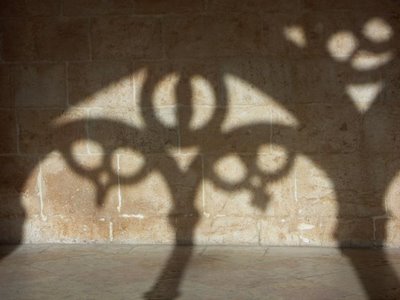Jazz Portraits questions young musicians' attachment to the past, a trend excacerbated by the Young Lions backlash:
"I think right now, especially amongst young players, it's NOT COOL to be into Bird or Dizzy, to really study their music (on one's own time - not in class) because that's going to label you in the current out of fashion group of the neo-boppers. It's not that I don't want to see musicians moving beyond bop, but there's both an ignorance and an arrogance that is just as troubling to me as anything controversial Wynton Marsalis ever said."
A backlash against the Young Lion backlash?
He makes a good point:
"Fast forward ten years, now many musicians are out of their attempts to reinvent the music of the 60's and are now doing the same for the music of the 70's. The sunglasses are different, the instruments are plugged in, and the coat and tie is gone... It's as if finally, musicians got the message that jazz is lacking in "innovation" and everyone is now scrambling (and overcompensating) to make sure they don't appear to be in that "non-innovation" camp, even if what they're doing is just as derivative as anything the neo-boppers ever did."
That whole spate of recordings (Payton's "Sonic Trance," Hargrove's "RH Factor," for example) belonged to that movement, or moment. Interesting or not, they were all a lot less innovative than their authors claimed or wished them to be. However, Jazz Portraits may be ignoring another aspect: could a Jason Moran have emerged had the Marsalis era not happened? What about all the technically-gifted inside-outside players? Maybe the Marsalis era provided a context, a clear ideology and focus, a renewed interest in history, that could be fruitfully exploited or reacted against. Just an idea.
Jazz Portraits was following up on an earlier post by pianist Armen Nalbandian. In comparing 2005's Big 4 new archival releases (Cellar Door, 1D1U, Monk/Coltrane, Parker/Gillespie), Nalbandian notes that the Parker/Gillespie got a lot less attention. I'm not sure that's true: the NY Times' Fred Kaplan called it "the Rosetta Stone of bebop," for Francis Davis of the Village Voice, 2005 "is shaping up as a year of archaeological finds. But nothing figures to top this." For my money (which was spent on all of these releases), nothing did. Simple consideration of the relative size of Uptown Records versus Sony/Columbia, Universal/Impulse! and EMI/Blue Note answers the visibility question.
As an aside, one thing I particularly love about the Town Hall album is that it sounds like music made by 25-year-olds. It's fast, brash, joyous and doesn't bear the weight of the rules that would later be imposed on bop.
Nalbandian claims: "Most people (including Jazz fans) don’t know (and possibly don’t care) about Jazz history. If we look back at the CD sales over the past decade, I have no doubt that the sales of releases from Jazz musicians such as Chick Corea, Brad Mehldau, and Joshua Redman far overshadow those backlist titles from Bird, Diz and Art Tatum."
That may be the first time jazz fans are accused of living too much in the present! What I've read tends to say that catalogue sales (apart from the odd Norah Jones or Diana Krall) outweigh new releases. My knowledge of jazz fans comes mainly from message boards and my own experience, which probably skews me towards the fanatics rather than the fans, but, if anything, tastes tend to run towards the good ol' days rather than the up-to-the-minute. Granted, this isn't quite the same as knowing your history, but I think that serious fans are interested in filling in the historical gaps.
Kneebody's Adam Benjamin has a fascinating essay on the Greenleaf blog that sort of deals with this issue, but from the musician's point of view:
"...freedom in jazz is a useful term only within the context of language. Someone not well-versed in the language of bebop melodies would find the style quite restrictive. And, in the context of the language of Frisell’s more recent music, he is able to express just as much as in his ‘freer’ forms, because of his fluency in the language
(...)
Additionally, consider that the development of the ‘freest’ forms of jazz in the 50’s and 60’s – free jazz, the avant-garde, etc. – was not a path to greater, freer expression for many musicians. In fact, the language of this music was so different than the language of more traditional jazz, that many musicians of previous generations not only found it to be a restrictive and unexpressive form for them to play, but foreign enough that they did not connect with the versatile expressions of those who developed, and intimately understood, the language. Anyone who is fluent in the languages of both traditional jazz and free jazz will tell you that, despite the apparent lack of rules and restraints, free jazz is no more or less intrinsically expressive, nor is it easier to play."
The whole essay is detailled and engrossing.
Finally, Jazz Portraits also asks if people in other genres get tangled up in "that's not jazz!"-type debates. He believes not, but I've spent enough time on hip hop boards to know that the boundaries are just as tightly policed everywhere.
 A hidden face of the music industry:
A hidden face of the music industry: 













